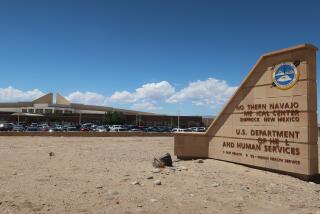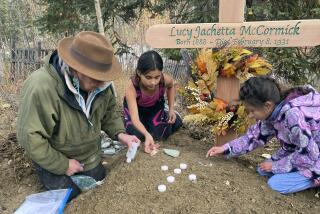Eskimos Shaken by Maltreatment of Elderly : Tradition: Alaska Inupiat community, where reverence for elders is a basic cultural tenet, tries to come to grips with the discovery of neglect at its nursing center.
- Share via
ANCHORAGE, Alaska — Even in a culture that proclaims a reverence for tradition and the elderly, elders can be forgotten and neglected.
State and federal health inspectors last month ordered the Kotzebue Senior Citizens’ Cultural Center to close its nursing wing. They cited severe nutritional problems that threatened the health of five of the wing’s nine residents.
One resident was dangerously underweight, and many were not being fed properly or sufficiently. Administrators, doctors, nurses--all had failed to make sure that the elderly were getting proper care.
The closure was later delayed and the center was given until July to reorganize, but the discovery of elders forgotten by the system has surprised and upset young and old alike in the small Inupiat Eskimo community on the Bering Sea coast just north of the Arctic Circle.
After all, elders represent the wisdom of the ages. According to Inupiat tradition, the old are viewed as a community resource. They are to be loved, respected, obeyed and aided.
“Respecting elders and taking care of others is tantamount to what life is all about,” Ted Mala, state commissioner of health and social services, said in an interview.
Mala should know. Though he spent much of his youth living and studying outside the state, he is half-Eskimo and half-Russian.
“I have a vested interest in Kotzebue. That’s where my roots are,” he said. He sent his top deputies to Kotzebue and has taken a special interest in helping leaders there resolve the problems at the center while keeping it open.
“A lot of things went wrong. . . . No one took responsibility. Everyone assumed others were,” he said.
Once problems at the center became known, Kotzebue residents reacted immediately.
“It raised a lot of fear and concern among the elders and their families,” said Hanna Loon, an employee of the NANA Regional Corp. who works with elders in the region’s outlying villages.
NANA is one of 12 regional corporations set up after passage of the Alaska Native Claims Settlement Act of 1971. Its nonprofit arm, Maniilaq Assn., had operated the senior center.
Respect for elders is basic to the society, Loon and others say. And despite television, jet air travel and other modern ways, tradition is as strong in northwestern Alaska as anywhere in the Arctic.
“If you see an elder chopping wood or bringing wood into the house, you don’t ask them if they need help. You go in and help,” Loon said.
Children walk behind their elders. Youths are taught to listen to the advice of elders and obey as if it were law.
State and community leaders say they hope the problems can prompt a renewal of faith in the old values, help communities around the state renew their commitment to their older residents and improve nursing home care for all elders.
“I think this is one of the healthiest things that could happen to any community,” Mala said. “It’s amazing and very wonderful how quickly this whole situation coalesced the whole community to do something.”
Pete Schaeffer, NANA’s vice president for government relations, said community leaders are working to make the center responsive to elders’ needs and to keep the Eskimo traditions.
The former director was dismissed. Consultants have been hired as the center’s new director and dietitian. The Maniilaq Assn. will no longer administer the center, and community leaders have formed a new board of directors.
The board already has met several times in emergency session to discuss the senior center.
Center administrators will experiment with integrating indigenous foods such as bear meat or trout into daily menus.
More to Read
Sign up for Essential California
The most important California stories and recommendations in your inbox every morning.
You may occasionally receive promotional content from the Los Angeles Times.










